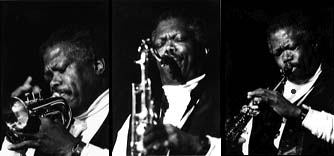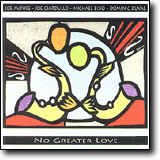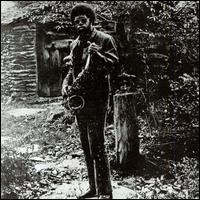

Courtesy
of Joe McPhee

C.I.M.P.

Atavistic
A
FIRESIDE CHAT WITH JOE MCPHEE
Joe McPhee is a monster musician. Joe is as proficient on the trumpet
as he is on the straight horn, the tenor, the alto, and clarinet. Ken
Vandermark, another monster player credits him as a heavy influence. That
should be enough for all you avant-ists to memorize this insightful conversation,
unedited and in his own words.
FRED JUNG: Let's start from the beginning.
JOE MCPHEE: I had experiences in school, in grade school, high school
and eventually, in an army band in Germany. It was there, I met some musicians
who really showed me the ropes about improvisation and playing jazz. I'd
listened to a lot of jazz music, pretty much mainstream bop and neo-bop
stuff. And then in early 1961, '62, I started to hear the music of Ornette
Coleman and some really transitional stuff by John Coltrane. And shortly
after that, of course, I was introduced to the music of Albert Ayler,
which destroyed me forever.
FJ: What were some of the things that caught your ear at that time?
JOE MCPHEE: A lot of Miles Davis, the real hero. I listened to a lot of
Miles Davis and Cannonball Adderley, Horace Silver, the Jazz Messengers,
people like that, Sonny Rollins, and then I heard Charles Mingus' Pithecanthropus
Erectus and that spun me around again and I traded a copy of my Prestige
recording, Bags' Groove to a friend for Pithecanthropus Erectus and I
had mixed feelings about that for a long time because my Bags' Groove
was gone and then I had this new music and it opened some doors of perceptions.
FJ: What aspects of Pithecanthropus Erectus intrigued you?
JOE MCPHEE: Well, it was very unconventional and it was almost like field
hollers and things like that. It seemed to be not so tied down with the
structures that I was used to with bebop and that sort of thing. It was
more open. The time flowed differently. It was just a very groping, mind-opening
experience for me.
FJ: Give me your personal assessment of the impact of John Coltrane.
JOE MCPHEE: Well, John Coltrane is beyond words. I can tell you, Fred,
a specific recording that turned me around and set me in another direction
and that was "Chasin' the Trane." I mentioned briefly that I was working
for this factory while I was working at night. I came home late one night
and I heard "Chasin' the Trane" and I stopped in front of my house and
sat in the car absolutely stunned, pinned to the seat. I had never heard
anything that made me feel like that. And the very next day, I went out
and bought it and played the recording until all the grooves wore off.
I think it is absolutely clear here. John Coltrane passed away in 1967
and the impact of his music is just astounding even today. I think there
was a recording that came out a couple of years ago, which sounds as fresh
and as exciting as anything you can imagine being done today, probably
more so.
FJ: And Ornette Coleman?
JOE MCPHEE: Well, I just had a CD released call The Dream Book (Cadence,
www.cadencebuilding.com),
which are a series of duets with Dominic Duval, the bassist and myself
that is dedicated to the music of Ornette Coleman. Ornette is another
one. He's one of those people who changed the course of your life and
you're in a new direction forever. I think he is one of the most important
figures in the whole history of jazz.
FJ: Do you recall your first gig?
JOE MCPHEE: My first jazz gig was almost a disaster because I was so excited
and nervous about playing that when it came time for me to play a solo,
I almost passed out. It was kind of funny. It was playing locally with
some bands that were playing pretty much stuff out of the real book, that
sort of thing.
FJ: You served in the military, what branch of the armed forces?
JOE MCPHEE: It was the army.
FJ: How long did you serve?
JOE MCPHEE: Well, I got drafted, way back in those days when they drafted
people and it was two years. It was a very fortunate occurrence for me
because I wanted to become more involved with electronics and computers
at that time. I was studying electronic technology in college. I thought
I could get some practical experience for work later. There wasn't a place
for me in that particular school, but they had an opening for a trumpet
player. I hesitated because I really didn't want to go around playing
the trumpet. I had been in marching bands and it wasn't particularly interesting
to me, to walk around getting my lips beaten up by the trumpet bouncing.
But the option they gave me was, "Well, you can go into the military and
become an infantry guy or play the trumpet." So it was a no brainer. I
joined an army band.
FJ: Life has a way of working out like that.
JOE MCPHEE: It did because I went to a band training school, which was
excellent and I came in contact with some wonderful musicians and since
that was my work, everyday I got up and I went to work in a rehearsal
hall or playing at concerts and I was in Europe. It introduced me to a
really great experience.
FJ: Along with the various saxophones, you also play the trumpet. Was
it a natural progression?
JOE MCPHEE: That's curious because I first played exclusively until I
was about twenty-eight. I was working for a company that went on strike
and fortunately or unfortunately, they were on strike for two years, so
during that period, I decided, I always wanted to play a saxophone and
never really gave it much thought because I wanted to stick to the brass
instruments anyway. My dad always told me that, "You can't do that. You'll
be a jack of all trades and a master of none if you try to do that." But
then I never liked when somebody told me that I couldn't do something
so, of course, I tried anyway. When I was twenty-eight, I bought a saxophone
from a friend, a tenor, and immediately went to a local bar, where they
would allow me to play trumpet and I came with a saxophone and they wanted
to run me out of there. I thought I was instantly Albert Ayler and they
wouldn't have any of that. And a year later, I hired the guys who told
me that I couldn't play. I hired them all for my first recording (Black
Magic Man, Hat Hut) and I played tenor, which was nice.
FJ: Never bow down.
JOE MCPHEE: Well, because I started to break some rules and I started
to do things that people told me that I couldn't do. I really would like
to fly straight up without benefit of an airplane. I just have to figure
out how to do that one day.
FJ: Do you enjoy being a maverick?
JOE MCPHEE: No, not so much that people tell me what I can't do, I don't
know what can't is. I think you can do anything you can imagine you can
do. Sometimes it takes a little longer and it's more difficult, but if
you set your mind to it, you can. So if that is being a maverick, then
to that I say, "Yes." I don't specifically go out to prove people wrong
or something like that.
FJ: You have had a storied association with Hat Hut, the label essential
starting to document your music.
JOE MCPHEE: That's right, yeah. It is now beginning its twenty-fifth year
in existence. I just had a email from Werner Uehlinger, who is the executive
producer of Hat Hut Records, sort of, proposing a project for this year,
which we have to talk about. It all stemmed from CJR Records, which was
a co-production with Craig Johnson, who was a painter and a mentor of
mine. He wanted to record my music, which I thought was ridiculous, why
would anyone want to record my music, I thought. This was 1969 or so,
but he did and one of those recordings fell into the hands of Mr. Uehlinger
and on a business trip here to the United States, he came to West Park,
New York, which was the home of CJR Records and we spoke one afternoon
and had dinner and out of that conversation came the idea of releasing
some of the material that we had. We didn't have the money to release
it ourselves at the time and he up it out, not really wanting to create
a label, so much as to get the music out. It was out of that that the
label started. There were four recordings of mine and he decided that
he can't have a label with one person and he started to introduce other
people. There was Cecil Taylor and Max Roach and Anthony Braxton and on
and on until it is the label that it is today.
FJ: Let's touch on your CIMP release, The Watermelon Suite.
JOE MCPHEE: Oh, thank you. Well, let me tell you a little bit of the background,
Fred. That group, Dominic Duval on bass, and Dominic for a long time was
the bassist with the Cecil Taylor Trio, and Jay Rosen, who is the percussionist
on it. We got together for a performance at the Vision Festival, which
was, I guess, three years ago. I think it was about then. We appeared
at the Vision Festival and immediately after that, drove up to North Country,
which is close to a eight hour drive, seven or eight hour drive, all through
the night. We arrived at North Country, CIMP and went to sleep, got up
and recorded that the next day. At the same time, we were doing another
project that was called, that became CIMPhonia '98, with Paul Smoker,
Dominic Duval, and myself. There were seven of us. It was done simultaneously
with that other recording. It was quite an amazing thing. The producer
of CIMP (Bob Rusch) put this artificial watermelon, he was joking, making
a big joke, and put it in front of us, no, it was a real watermelon as
I remember, he put it in front of us and said, "Improvise on this." And
we said, "OK," and we started doing it. It was sort of a lark, but then
it became very serious and turned into this four part improvised suite.
That's the genesis of that. Strangely enough, Fred, after we performed
at the Vision Festival, that nobody said anything about us and there was
only one written article that I can remember and it was not very complementary
and it was on the internet saying that we'd probably be, it was a short
term group and we'd only be together for a year maybe or whatever and
thus the name Trio X. We stayed together and Trio X is quite OK.
FJ: You collaborated with Ken Vandermark, an outspoken advocate of your
music, on the Okka Disk recording, A Meeting in Chicago.
JOE MCPHEE: Well, I met Ken in 1993 in Vancouver. I had seen an article
where he did make those comments about my music being influential. I ran
into him and I just said hello and he was startled at this meeting. Then
he invited me to the concert, where I heard for the first time one of
my compositions played. I was really impressed because it was something
that they had been working on for a while. I think Ken is a wonderful
musician. He's a gentleman and he recently was awarded a grant and he's
putting to good use. He's taken a lot of flack and I think that is unfortunate.
I think he's created a scene or helped to create a scene there in Chicago.
He's been a very important, influential part of the Peter Brotzmann Chicago
Tentet, which is going to have an extensive tour this summer. We're coming
to a neighborhood near you. Let me just mention one more particular release,
which I hope is coming soon, that I am very excited about and that is
tenor duets with Evan Parker that was recorded in Chicago.
FJ: Nice pairing.
JOE MCPHEE: I hope so. Evan is a terrific player and I really like him.
He's a wonderful person.
FJ: Has it been difficult to economically sustain the form of music that
you play?
JOE MCPHEE: In what sense?
FJ: In the sense that the powers that be malign the music you play.
JOE MCPHEE: Well, yes, that happens all the time. That doesn't bother
me so much. The criticisms don't bother me if they are honest. People
can disagree or agree with the music, that doesn't bother me. It's when
they are not honest and they deal with personality and a bunch of bullshit
that really gets me. The music can stand on its own. I don't have a problem
with that. When I said the critic on the internet was less than complementary,
he dealt with things, he made remarks like, "Where is Rashied Ali when
we need him? Do we need someone playing on cymbals with a bow these days?"
I thought that was stupid and uncalled for. It had nothing to do with
the music. It was some kind of personal nonsense. There are not very many
venues to play the music that I want to play. If I wanted to play music
that was a regurgitation of music from the '50s or something like that
or what jazz is supposed to be in the minds of many people, yeah, I could
play probably more, but I like to play music that is more challenging
and that is not background music and that makes it difficult.
FJ: Do you feel that pattern will change?
JOE MCPHEE: It has to change because that is the nature of jazz, flux
and change. It can't be otherwise.
FJ: Touring around the States, have you noticed your audience getting
younger?
JOE MCPHEE: I'm getting older so everybody looks younger (laughing). I
think that in fact, what I am finding is that people who are attracted
to the music because it makes them feel something. A lot of young people
are just fed up with their MTV and all this crap. They don't want things
regurgitated. They want experiences for themselves and they're discovering
it. That's why I'm playing in a lot of what would be called alternative
rock places or alternative music. It is just about music. It doesn't need
a category like jazz, which is confining anyway. I don't know what to
call the music I play. It comes certainly from a jazz background and influences,
but a lot of the music is just improvised music and it's music from the
heart and it's played with people who I love. That's the only thing I
can think about.
FJ: And the future?
JOE MCPHEE: There are a number of things. One that is coming very soon
on a French label, whose name I can not recall off the top of my head
right now, but it's music that was recorded in 1992 with a wind quartet.
It's an hour-long concert that was dedicated to the late Frank Wright,
a saxophonist and a very wonderful musician.
Fred Jung is Editor-In-Chief and needs a co-host. Comments? Email
him.